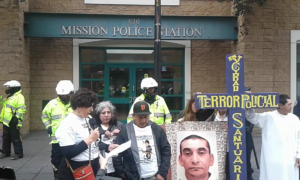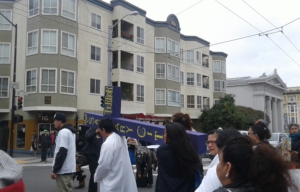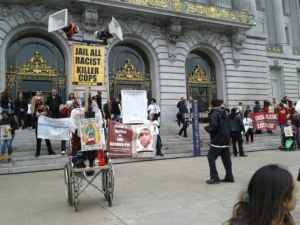
For Mayan immigrants, Luis Gongora Pat and Amilcar Perez-Lopez, San Francisco’s status as a “sanctuary city” did nothing to protect them from murder at the hands of the San Francisco Police Department.
The morning of Friday, April 7, a year to the day of Luis Gongora’s death, family, neighbors, and activists gathered at the site of his murder, in the heart of the gentrified Mission District. Opening with a traditional Indigenous Mexican ceremony for the slain man, people took to the streets to march, stopping at key sites like the Mission Police Station, the apartment Luis lived in before his eviction, and the steps of City Hall. All these places serve as symbols of the ways in which this so-called sanctuary city failed this man, and many others like him.

Suffering through unsteady work, job loss, an eviction and declining mental health, Luis spent the last months of his life living in a tent. Police arrived at the homeless encampment on Shotwell Street, on April 7, 2016, following reports of a man walking around, swinging a knife. Luis was shot to death, includiding with a bullet to the head, with the tired SFPD excuse that the man “lunged at the officers while armed.” Eyewitness accounts dispute this version of events.
At the march, protesters, all too familiar with police violence in San Francisco, called for justice and more than just reforms. As they made their way through the city’s streets, people chanted, “Indict, convict, send those killer cops to jail. The whole damn system is guilty as hell!”

The same sentiment was echoed during a demonstration the following Wednesday night, after SF District Attorney George Gascon cleared two officers in the February 2015 shooting death of Amilcar Perez-Lopez, an immigrant from Guatemala. True to the SFPD narrative, Amilcar was also claimed to have charged at officers with a knife, even after separate autopsies concluded that he had been shot in the back. About two dozen people blocked the street in front of Mission Police Station. One protester that night said of the police, “They are draining the people, they are a scourge on our community, and it’s time for us to stop relying on them and start relying on ourselves.”
Some demonstrators at the different actions connected the racist murders of Luis and Amilcar to the overarching workers’ struggle. One of the signs carried during Friday morning’s march read: “Dishwashers and prep cooks are 2 of the lowest paying jobs in the U.S.,” referring to the work Luis had done in this country since his arrival in 2002. At a press conference addressing the lack of consequences for Amilcar’s killers, Benjamin Bac Sierra of the Justice for Alex Nieto Coalition, described Amilcar as “the person who roofs your house. He is the person who washes your dishes and picks them up when you eat at restaurants.”
Speaking about Luis, housing rights activist Tommi Avicolli Mecca called the crisis of homelessness in San Francisco “another symptom of the absolute sickness of capitalism.” He continued, “The police have always been a force that has protected the people with property. It’s always been a force against immigrants. It’s always been a force against the poor, and we need to change that. And maybe we need to move to a model of community policing… I think what justice looks like is redoing this thing called the police.”
While we continue to live in a system that exploits the labor of so many, immigrants especially, and kicks people out of their homes to ensure the comfort of the few, while police “protect and serve” only the survival of capitalism, neither San Francisco nor any other city in this country can be a true sanctuary. Justice will not be possible in a place that has no qualms about using, abusing, and killing people like Luis Gongora Pat, Amilcar Perez-Lopez, Alex Nieto, Mario Woods, Jessica Nelson Williams, and many more.
To put an end to racist police violence, there must be an end to the capitalist system that devalues Black and Brown lives. Nicole Rivera, protesting on Wednesday night, said “I feel like right now we’re really close to… I don’t want to say revolution, but I definitely feel like something’s gonna come out of this… it has to. We have to continue to fight, continue to survive.”





